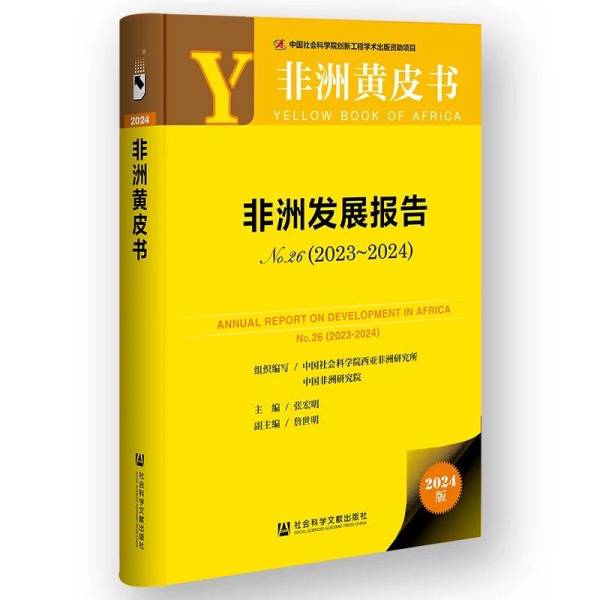ANNUAL REPORT ON DEVELOPMENT IN AFRICA No.26 (2023-2024)

Abstract
In the context of the superposition and interaction of multiple factors such as the century of change, the Ukraine crisis, and the global economic downturn, the situation in Africa in 2023 shows the following characteristics.
First, Africa's political situation is generally stable, but local security risks are rising. In 2023, the political and security situation in Africa will continue to maintain overall stability amid the interweaving of changes,and peaceful development will remain the mainstream. During the year,15 countries,including Nigeria, the Democratic Republic of the Congo, Zimbabwe, Gabon and Liberia,held presidential or parliamentary elections, which were generally smooth and the problem of prone to chaos during elections was alleviated.However,under the influence of external power competition and internal governance crisis, political and security risks in some parts of Africa are on the rise, which is highlighted in the following military coups in Niger and Gabon, attempted coups in Burkina Faso,Sierra Leone and Guinea-Bissau,and a new round of “coup wave”seems to be spreading; Burkina Faso,Mali and Niger announced their withdrawal from the Group of Five Sahel countries and established then “Sahel Union of States”. The complicated and intractable internal conflicts in Sudan, Ethiopia and the Democratic Republic of the Congo not only seriously undermine the internal stability of the three countries, but also have a major impact on the regional situation.The counter-terrorism situation in Africa still faces severe challenges, especially the deteriorating and spillover terrorist situation in the Sahel region.In the face of difficulties and challenges, African countries are committed to solving African problems in an African way and actively exploring development paths suited to their own realities.
Second,Africa's economy has bottomed out, but the pace of economic recovery has slowed. In 2023, African countries will focus on recovery and development after the epidemic, and the economic situation will be mixed. Due to the global economic slowdown,rising geopolitical tensions,global monetary policy tightening, climate disasters and other factors, coupled with the sluggish performance of major economies such as South Africa, Nigeria and Angola, Africa's economic growth has fallen short of expectations. Inflation in Africa is at its highest level in a decade,driven by rising food and energy prices as a result of the Ukraine crisis and the depreciation of African currencies against the dollar.Thanks to fiscal consolidation and debt restructuring,the fiscal deficits of African countries have begun to narrow, but due to weak international demand and commodity price fuctuations, Africa's terms of trade have deteriorated,the current account deficit has widened, and foreign direct investment has declined slightly.The African continental Free Trade area is in the ascendant and the integrated market is beginning to take shape, which is expected to drive the sustained recovery of consumption,manufacturing and tourism services. Looking ahead to 2024, if African countries can work to reduce the imported shocks from geopolitical risks, accelerate the development of renewable energy industry to improve energy poverty,improve debt servicing capacity,reduce debt risk, Africa's economic development will be improved.
Third,Africa enjoys a strong momentum of self-reliance through unity and greater strategic independence. In 2023,all parties in the world will increase their strategic attention and investment in Africa,and Africa will become an important variable affecting the international balance of power.In the context of the great changes,Africa,as the continent with the largest concentration of countries in the “Global South”,has become the object of competition among major powers.The United States and Western countries have successively visited Africa,and Russia, Saudi Arabia and Italy have successively held summits with Africa,which has brought opportunities for the promotion of Africa's strategic autonomy.The African Union has been formally invited to join the G20,helping to strengthen Africa's visibility and voice on the international stage.South Africa held the 15th BRICS Leaders' Meeting and successfully led the expansion of BRICS membership,Ethiopia and Egypt became new members of BRICS. Major African powers proposed an African version of the“peace initiative”to resolve the Ukraine crisis, and sent delegations to Russia and Ukraine for diplomatic mediation,which significantly increased Africa's international influence.In the face of disputes between major powers outside the region,African countries have adopted a flexible,pragmatic and non-exclusive balanced policy,opposing the introduction of great power competition into Africa by the United States and the West,and refusing to“choose sides”.In addition,African countries have demonstrated their collective influence by speaking with one voice in global affairs such as climate change and Security Council reform.
In 2023,China-Africa exchanges and cooperation in various fields will make steady progress.The 16th Senior Officials' Meeting of the Forum on China-Africa Cooperation (FOCAC) was successfully held,and the implementation of the nine projects made steady progress.In 2024,a new summit of the Forum on China-Africa Cooperation will be held.China and Africa will work together to elevate practical cooperation to a higher level.
Keywords:
African Situation;Political Situation; Security Issues; Economic Recovery; Strategic Autonomy


